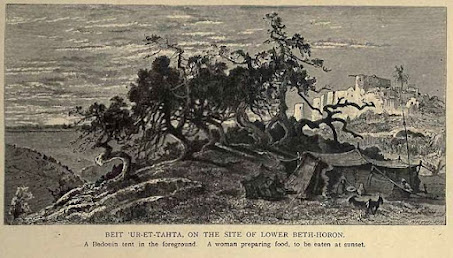by Naomi Craig
Ancient Egyptian Women, Wikimedia
Upper and Lower Beth Horon (now Beit Ur el foqa and Beit Ur el tachta) are mentioned several times through the Bible.
Sun looks out of the dark clouds, Wikimedia
Remember when Joshua asked for the sun to stand still so he could defeat the kings of the Amorites, and the Lord threw down rocks from heaven to defeat Israel’s enemies? (Joshua10)? That was on the ascent and descent to Beth Horon.
The Beth Horons were in the Land allotted to the tribe of Ephraim, and one of them was a Levitical city of refuge (Joshua 21:22)
Right after King Saul made that unlawful sacrifice before Samuel could get there, the Philistines encamped and were eventually driven out at the pass of Beth Horon and Aijalon Valley (1 Samuel 13:18, 14:22,31)
Solomon fortified the cities with gates and walls (2 Chronicles 8:5)
Upper and Lower Beth Horon also played into the Jewish revolt of the Maccabees between the Old Testament and the New Testament.
But what about when it was built? Or more specifically, WHO built it.
The student's manual of ancient geography, based upon the Dictionary of Greek and Roman geography (1861)
1 Chronicles 7:20-24 is a brief break from the line of geneaology. In it, the only time mentioned in scripture is “Now his daughter was She’erah, who built Lower and Upper Beth Horon and Uzzen She’erah.”PikiWiki Israel 64666 upper beth horon village, Wikimedia
And then we are right back to the begats.
Hold on. Back up.
Women aren’t mentioned often in the Bible, so when they are it stands to reason that there was something pretty epic about this lady.
Not to mention the little fact of a woman building three cities. Even more intriguing is that two of the three cities are standing to this day.
According to my research, She’erah was Ephraim’s daughter. His dad was Joseph—you know the guy who went from slave/prisoner to Pharaoh’s vizier in a matter of minutes because the Lord gave him the wisdom to save Egypt from the seven year famine. (Read my post on the Biblical Joseph in Egyptian history here). Ephraim’s mom was Egyptian, making She’erah at least a quarter Egyptian.
I bring that up to point out She’erah would have had access to Egyptian wisdom and resources as she’s building these cities. What would have brought her up out of Egypt to build off the Aijalon Valley?
The Bible doesn’t say, but because all of the nations owed Egypt big time for keeping everybody alive during the famine, and the Bible documents that people eventually gave their land to Pharaoh when all other resources ran out. In my imagination Pharaoh pretty much had the makings of an empire.
Also, while Joseph was still alive, and for many years after, the Hebrews and the Egyptians lived in harmony. It was only much later when Joseph was forgotten that the Hebrews were made into slaves.
So here is a woman, granddaughter to Pharaoh’s vizier, part Egyptian, part Hebrew, trying to establish herself in a man’s world by building cities.
Yeah, that sounds like an easy task.
True, Egyptian women DID have more rights than Hebrew women traditionally. However, I can’t imagine all the men in the clan and camp would have been thrilled working under a woman architect.

Bethoron Tahton - Lower Bethoron 1880,Wikimedia
Have you noticed the insert about She’erah and her family before?
She'erah's Legacy
As tragedy ravages the camp, can She’erah step up and complete the outpost?
She’erah is a woman trying to leave her mark in a man’s world. Her vision and ability surpasses her father’s, yet she remains second-in-command as they are tasked to build Pharaoh’s outposts in Canaan. She knows she is worthy of the task, but her clan is skeptical.
The last place She’erah expects support is from her charioteer, but Lateef is the lone voice of encouragement. His integrity and steadfastness is a plumb-line in She’erah’s life and she can no longer deny her growing feelings for him.
Acts of sabotage threaten the construction and the shaky foundation of She’erah’s pride. It’s up to She’erah to break generations of rivalry, distrust, and jealousy—if she can learn to rely on the strengths and abilities of those around her to help.
Will she learn to trust God and others before her life’s legacy comes crumbling down around her?
She’erah is a woman trying to leave her mark in a man’s world. Her vision and ability surpasses her father’s, yet she remains second-in-command as they are tasked to build Pharaoh’s outposts in Canaan. She knows she is worthy of the task, but her clan is skeptical.
The last place She’erah expects support is from her charioteer, but Lateef is the lone voice of encouragement. His integrity and steadfastness is a plumb-line in She’erah’s life and she can no longer deny her growing feelings for him.
Acts of sabotage threaten the construction and the shaky foundation of She’erah’s pride. It’s up to She’erah to break generations of rivalry, distrust, and jealousy—if she can learn to rely on the strengths and abilities of those around her to help.
Will she learn to trust God and others before her life’s legacy comes crumbling down around her?
Author of Biblical fiction, avid reader, pastor's wife, Naomi loves reading the Bible and imagining how things were at the time. When she’s not serving in various areas at church or trying to stay on top of mountains of dishes, you'll most likely find her enjoying a good book and a cup of coffee. Naomi co-hosts #BehindTheStory on YouTube and helps facilitate Biblical Fiction Aficionados Community on Facebook. When not writing or trying to wrangle social media, Naomi attempts to get her rescue dog to be cute on command for the many pics she takes throughout the day.
Preorder She'erah's Legacy here

.jpg)

_(14769276775).jpg)



Very good article, Naomi. I look forward to reading the book.
ReplyDeleteThanks michelle!
DeleteThank you for posting today. I learn the most interesting things here!
ReplyDeleteIsn't that a fun one?
DeleteI love the biblical story of She'erah! Fun and interesting post! Can't wait to read your book!
ReplyDeleteThanks Dana!
Deletecannot wait for the book
ReplyDeleteThanks Charlene!
DeleteI am getting really excited to read this book! I love learning about people that I didn't' even realize were in the Bible!
ReplyDeleteThanks so much Cathy!
Delete